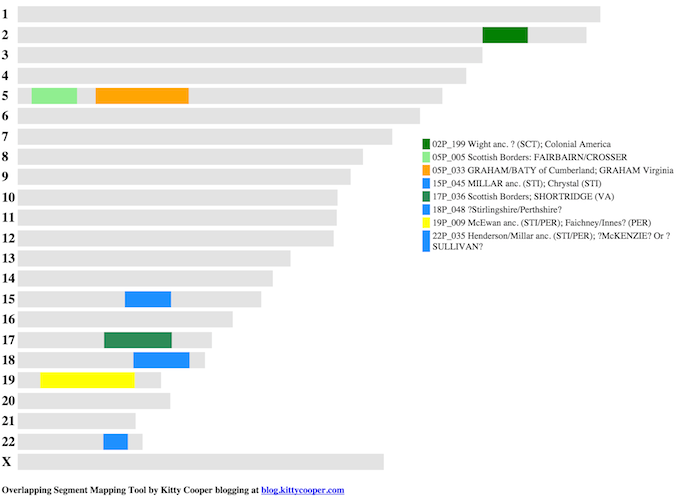DNA Groups
On this page:
Introduction
DNA testing
The groups
About Google Groups
About Facebook Groups
Introduction
As you have reached a page entitled DNA groups, it is assumed that you have an interest in DNA testing for genealogy.
As do I.
DNA testing for genealogy is a great addition to our toolkits, and my main focus is meant to be to crack my brickwalls - ancestry of
William AUSTIN,
William CLINTON,
Jane GIBSON,
Archibald HENDERSON,
Amelia MILLAR,
John DAVIDSON and
Archibald FAIRBAIRN.
But it is great fun being sidetracked onto unknown relatives that pop out of the woodwork from matches.
What I'm trying to do here is leverage the power of collaboration, which genealogists are great at, to pool knowledge, trees and research to focus on the specific task of finding common ancestral lines between groups of matches.
With autosomal DNA we get presented with large numbers of matches, and data about where the DNA matches (chromosome number, start and end points for the match, along with a "strength" of match indicators in cMs, and the number of positions tested/matched - Ancestry test takers need to either upload their raw dna data file to
GEDMatch.com or
transfer it to FamilyTreeDNA or
MyHeritageto get this data as Ancestry does not provide it).
What can then be done with this is to form groups of people who match at the same spot, and thus share a common ancestor, somewhere/somewhen in the past from whom they all inherited that segment of DNA - called Triangulated Groups.
Read
why we triangulate our matches from Mr Triangulation himself, Jim Bartlett, a stalwart of the DNA-NEWBIES list, and read what Roberta Estes has to say
about Jim and his new blog.
The power of collaboration should, at the very least, result in an increase in knowledge, even if the common ancestor is never found! At least some in the group must surely be able to work out how they are connected, which will give clues to others in the future.
Along with the group pages here, with their links, as appropriate, to WikiTree and FamilySearch collaborative trees where specific people and trees may be found, any of my own research into the more likely candidates for matches may be found on any/all/some of the following:
DNA testing
Have you ever considered using DNA testing to advance or confirm your genealogy?
Unsure where to start?
Check out the
ISOGG Wiki (International Society of Genetic Genealogy) particularly the
Beginners Guides, where Kelly Wheaton's tutorials are particularly recommended.
Our primary test of choice is FamilyTreeDNA's
FamilyFinder test.
Using this link will give WikiTree.com a small donation - well deserved as they provide a great free collaborative one world family tree website, including some interesting DNA tools.
You may also be interested in uploading your raw data files to the third party site
GEDMatch.com where data can be compared across the main companies: MyHeritage, FamilyTreeDNA, Ancestry and 23andme (provided they've uploaded there of course!)
This upload is particular recommended for Ancestry test participants as Ancestry does NOT give you the tools necessary to see where you match someone else, as they simply do not provide a chromosome browser.
Look forward to finding you're a good sized match and your DNA holds the key to a mystery shared ancestor for someone.
The groups
Only the front pages of each group are publicly visible, with more data visible to those authorised to view.
All of the groups themselves are private to members only, but "discoverable" via a bland frontpage that will only mean something to those who understand dna matches
Click on the bar in the appropriate chromosome to go to the group for that segment.

Plus some not yet image mapped onto the above chromosome "painting":
Google Groups
For those who don't know about google groups, they are simply an easy way to email a group of people interested in a topic.
You do not need a google account or a gmail address to use that facility.
But if you join with a google account, and use that email as your group email,
you have the additional benefit of being able to log in to the group and read the email history via your web browser.
Facebook Groups
Similar concept but on Facebook and needs a facebook account.
As you can probably gather, I prefer Google Groups but there is at least one on Facebook by way of a trial.